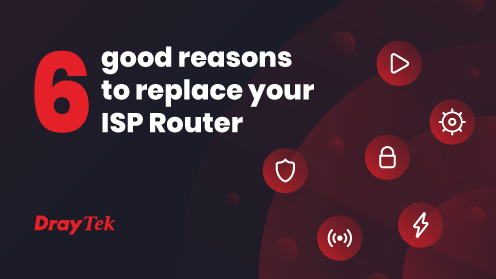Six good reasons to replace your ISP router
Six good reasons to replace your ISP router

How your home and business can prepare for Gigabit broadband
For the best connectivity, security and performance, you need to switch to a router that can give you more
Look at the router in your average UK home and, more than likely, it will be the unit supplied by the ISP. After all, it does the job, the ISP is happy to support it, and it comes at everybody’s favourite price: free. Yet by sticking with your ISP router, you could be missing out; missing out on features that protect your family or your business, that give you more control over your network and enable you to get the full performance from your internet connection. You could be missing out on options that make your connections more reliable and ensure you get the bandwidth you need, when you need it. Maybe there’s a reason why your ISP can send out subsidised routers, and why some routers are worth paying extra for. Here are six just to get you started.
1. Better connectivity
Admittedly, the days when ISP routers sported slow 100Mbit Ethernet ports and last-generation Wi-Fi are now thankfully over, but you might find yourself limited to just one or two Gigabit Ethernet ports, while the promised Wi-Fi 5 wireless networking turns out to support only the most basic level of 802.11ac, with a maximum speed of 867Mbits/sec on the 5GHz band. What’s more, routers like DrayTek’s Vigor 2862ac and 2865ac incorporate technologies like MU-MIMO, that support more devices simultaneously without interruption or throttling, or beamforming, which delivers a faster, more focused wireless connection to specific devices. You’ll be surprised what a difference these can make when you have a busy household with laptops, tablets, smartphones, smart TVs, games consoles and other devices all vying for bandwidth on the network.
2. Faster performance
In fact, there’s more to high-speed connectivity than just which Wi-Fi standard a router supports. Processing power, memory, chipsets and designs can all have a huge impact on performance, and on how efficiently your router moves traffic between each device and the wider internet, and between devices on the network. Different chipset and aerial configurations can also radically affect the speed and range.
ISP routers are designed to give you decent performance at a reasonably low cost. Third-party routers don’t have to be designed or manufactured with the same compromises, because the manufacturer is working under the assumption that users are looking for a desired level of features and performance. That’s why third-party routers will often incorporate into their designs additional features such as hardware acceleration, dedicated hardware processors for specific functions, such as VPN connections, and hardware based QoS.
3. Stronger security
Stick to your ISP router and you can expect basic levels of protection, including WPA2 encryption for the local wireless network and a firewall to guard against the most common internet-based threats. But why stop there when a third-party router does so much more? For instance, DrayTek’s 2865ac model brings you WPA2 and WPA3 security for your wireless network, a robust firewall that supports both IPv4 and IPv6 traffic, content filtering to block potentially harmful sites or content, and features to set up multiple virtual networks or a guest network. These enable you to separate your work-related traffic from the network you use to connect up family devices, or provide basic wireless connectivity for visitors or friends in a secure way. What’s more, a router like the 2865ac will have stronger controls on access to its settings and firmware, along with setup processes designed to encourage good security practices. It all adds up to greater peace of mind.
More advanced routers also come with more advanced VPN support, including the ability to create more secure tunnels between, say, the office network and the home networks of key employees, and the ability to use more advanced forms of encryption if used at both ends. As more businesses supply routers and/or broadband connections to their workers, these features could become a must-have.
4. Smoother streams and trouble-free video meetings
Your average ISP router treats most traffic in much the same way; it doesn’t know or care that your video meeting is more important than the latest update to Call of Duty, or that a cloud-based business application is more latency-sensitive than a YouTube stream. That’s a problem in a household where many users are sharing the same network and contending for the same resources. That’s why a router like the DrayTek Vigor 2862ac or 2865ac comes with robust quality of service (QoS) features built-in, so that the router can prioritise video or VoIP calls, while you can select the apps and services that require VIP treatment. You can set up queues to prioritise specific computers or devices, servers, services or apps. The result? The bandwidth is there when you need it for demanding cloud-based apps or your next Teams meeting.
5. Reliability and resilience
Good connectivity isn’t just fast but stable. We’ve already touched on how the modems built into some routers are better at maintaining a stable connection and on how QoS features can work, but premium routers are also built to be more resilient than your average free ISP effort. After all, manufacturers like DrayTek have a reputation to maintain and warranties to support.
Yet what can really make the difference is a failover option, giving you a secondary connection the router can switch to if the main fibre connection fails. That’s why DrayTek offers routers that support an LTE 3G/4G connection as well as the more standard VDSL and ADSL. Should your fibre line suffer from a temporary interruption, crucial activities can still carry on as long as you have a suitable data SIM installed.
6. Management and control
Perhaps the most important plus for a third-party router, though, is that it puts you, not the ISP, in control. You have access to a wider range of settings, including the ones the ISP usually restricts because it thinks its users won’t need or understand them. You can set up your own guest networks and virtual LANs or install your own security updates. You can set up your own Web content and DNS filters, decide on your own DNS provider, or set up static IP addresses for every computer or device in the home. In some cases, you can create policies to control how different forms of traffic are routed or prioritised and decide how any firewall rules apply. You might have to get your hands dirty with a few complex-looking menus, but you’ll be surprised what advice and guidance you can find online to help you get to grips with it all.
7. Contracts
To upgrade the ISP router you often enter into a new fixed term contract. If you’re out of contract you can upgrade your router to a DrayTek and not need to lock yourself in. Plus, you could move to another ISP and keep your DrayTek.
Still sticking with your ISP router? Well, it’ll carry on working as it has before, but if you want a network that works more efficiently and securely, and that can use the full potential of your internet connection, think seriously about making the switch.
Shop for router and WiFi Access Points

Affordable & Professional IT Management Services. Our goal is to ensure your business IT systems are secure, efficient and downtime is kept at a minimum
Contact US – 020 3540 3650
Email Us – first@networkspecialist.eu
